Bruyneel's year of living stressfully
A season of strained relations for the man behind nine Tour wins
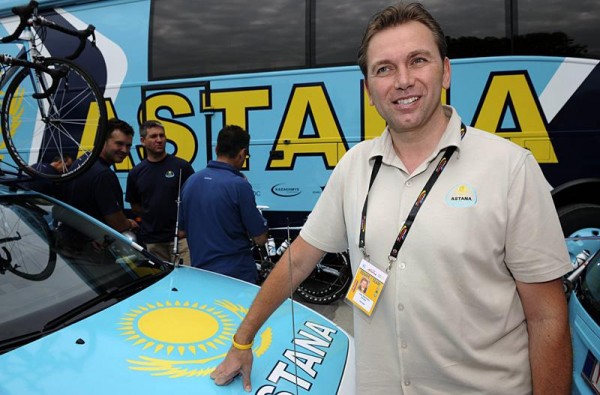
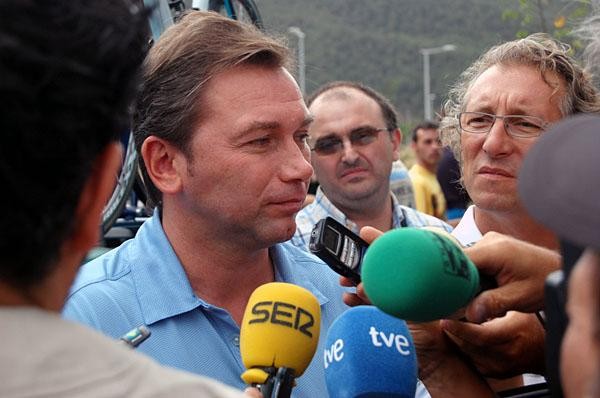
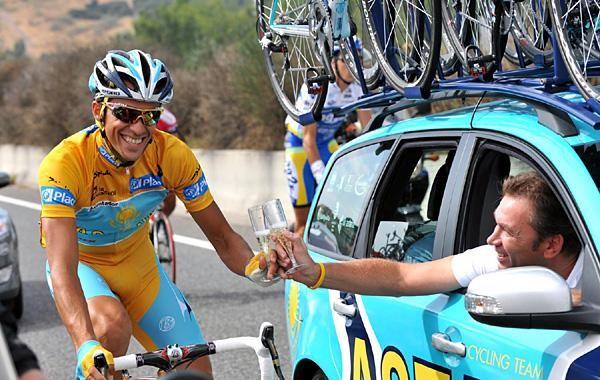
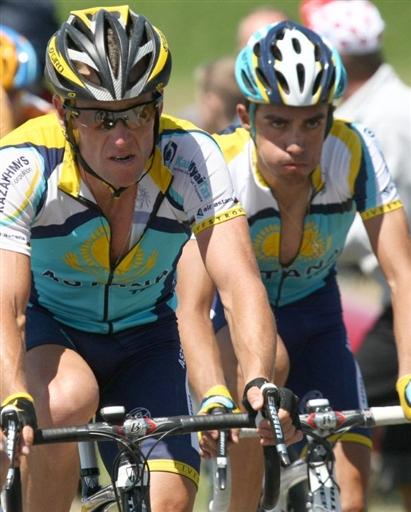
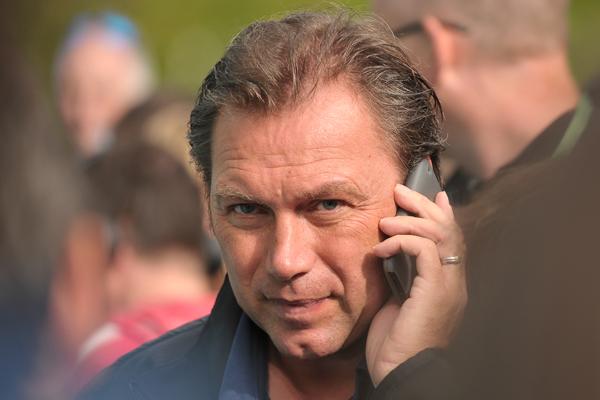
It's been quite a year for Johan Bruyneel. The man who guided Lance Armstrong, and more recently, Alberto Contador, to their Tour de France wins, opened up to Belgian lifestyle magazine Humo at home in Spain, talking about a season that included Armstrong's comeback, the death of Frank Vandenbroucke and strained relations with Contador, Alexandre Vinokourov and the man behind the Astana team.
An obvious highlight of Bruyneel's season was Armstrong's comeback, the Tour-winning pair reunited in France during July. It's a massive source of pride for the Belgian. "There were two components to the comeback of Lance. First: the globalisation of Livestrong, his cancer foundation. This went fantastically well everywhere. Second: racing at the top level," said Bruyneel.
"And top level for Armstrong means winning the Tour de France. That didn't succeed: Contador was way stronger, without discussion. But as a veteran, to finish third behind two young men, after three years without competition... try to copy that. During the last week I've seen a few glimpses of the young Lance: when he returned to the leader's group on the Petit Saint-Bernard, when he attacked Bradley Wiggins on the Col de la Colombière and how he controlled Fränk Schleck on the Mont Ventoux."
Bruyneel admitted that Armstrong's crash during the Castilla y Léon almost ended the comeback, however. "At that moment his comeback was on the verge of collapsing. Nobody knew that, except for some insiders. After the operation he was no longer motivated. He didn't want to race anymore.
"I had to force him: 'Lance, you have to. You can't go back now.' I had to send him one of his famous sayings: 'Pain is temporary, quitting lasts forever.' I didn't get a response, but he gave it a good think and pulled through. During the Giro it all came back together: during the last week he was riding at a decent level," said Bruyneel.
Like millions of fans, Bruyneel's reflections on the Tour centred on Armstrong's chances in the race. "The yellow jersey wouldn't have changed the outcome of the Tour, but what a statement it would've been: Lance Armstrong in the yellow jersey right after his comeback," said Bruyneel.
What becomes clear throughout the Belgian's commentary on La Grande Boucle is that the focus was on Armstrong, despite Contador's superiority on the road. "Lance realised he wouldn't win the Tour after the first mountain top finish in the Alps, at Verbier. It was clear: Contador attacked and took 1'35" on Lance. Until then it was also unclear to me how strong Lance would be: it was a continuous experiment," admitted Bruyneel.
The latest race content, interviews, features, reviews and expert buying guides, direct to your inbox!
"We didn't know what level he would achieve because we didn't have any reference points left from the past. And honestly, he surprised me. I saw him at the start of the season, in training and at the Giro: there are no miracles in cycling. You can't suddenly ride away from the best if you were unable to keep up with them a few weeks earlier. The highest possible was that he would be able to keep up with the best," continued Bruyneel. "I would've signed for such a comeback, but not him. He wanted to win the Tour."
There were shades of Hinault and Lemond at this year's Tour, with Armstrong and Contador the modern protagonists. "There wasn't much communication between those two, from man to man. But at the table at night everybody sat together and there were cheers and laughs," said Bruyneel.
"The atmosphere was perfect thanks to experienced guys like Klöden and Popovych. Those guys can remain neutral between - if you want to state it that way - the Amstrong-camp and the Contador-camp. Before the Tour there was already havoc: Armstrong wanted Chris Horner in the team and Contador wanted Benjamin Noval. In the end I didn't take any of them and it turned out to be the best decision because at the Tour we had a team without camps," he explained.
"In fact it was much less spectacular than what the press made of it - suddenly in Spain. I remained cool because the goal remained the same: winning the Tour. Not winning, that would've been indignity. There were eight candidates for the overall win, and four of them were riding in my team. I didn't care who won it, if it was one of Astana. That was the main goal right from the start, and we certainly had five or six meetings with the riders to make that clear," said Bruyneel.
Moving forward - without Alberto or Astana
Despite his claim that all was well at Team Astana during the Tour, a legacy remains from the episode, as Bruyneel explained. "He [Contador] continues to say that he won the Tour on his own. That is completly untrue: without the team he wouldn't have won the Tour that comfortably - maybe he would've won it, but still..." said Bruyneel.
"He started to act solo, together with his brother, who's his personal mechanic and press agent; I think that was sad. As it is now he remains with Astana, if they can get their paperwork done, and I'm doubting that. We talked about the team for 2010 and he knew we would start with a new team. But none of us thought about extending the co-operation," Bruyneel admitted.
"I had a professional relationship with Contador. The click to turn it into a partnership, like with Lance, never came. It had nothing to do with the comeback from Lance, it existed before. Between us there was always tension. I don't know why. For both of us it's better to split paths. Maybe later we can get back together when he's become older and wiser.
"The problem was that whatever I decided - the race plan, the team tactics, the riders selection - he always expressed his doubts. We all have the experience: we don't make mistakes anymore; while Alberto still has much to learn."
Bruyneel's view on the origins of the rift emerges, however. "He's a hero in Spain, a god! Suddenly he spots all those zeros after the number and that's the main problem.... Contador suddenly changed from the smallest contract to the best paid rider of the world in one season; then it's hard to stay with your feet on the ground," said Bruyneel.
The Belgian explained that the Astana team offered Contador a contract solely for 2007, when he was still questioned about his link to the Operacion Puerto case and after being handed the Tour de France win thanks to Michael Rasmussen's demise. Back then the Astana team heralded Bruyneel's work - the story has changed now "they kicked me out. After two years I still don't know what Kazakhi logic is. It's their mentality I couldn't stand.
"Astana was a synonym for rubbish and doping; nobody wanted to be linked to the team. I turned it around in six months, despite the opposition from ASO. We got results, without any suspicion. But in those two years I never received respect for my work, no appreciation at all and the Kazakhi were always acting difficult.
"Then I also got rid of the financial problems. This year that was a public case, but last year there were also problems. Payments were always late, and in bits and pieces, despite the signed contracts. The proceedings during the Giro were to make them act and respect the contracts. Even today, the same thing happens. The wages for September were paid with the bank quarantee, but the money that ought to be paid for the last quarter - before October 1 - is only half paid," Bruyneel said.
International relations 101
Humo asked Bruyneel who's calling the shots at Astana. After a few guesses it turns out to be Nicolai Proskoerin. "I didn't feel any appreciation from him for the work I did. He was always criticising, even when we won," said Bruyneel.
"Last year he visited the Vuelta, one day before the end. We had Contador and Leipheimer in positions one and two, and with one mountains stage left they couldn't lose it anymore. He said: 'Why aren't we leading the team classification and why are the two Kazakhi riders in the two last positions overall?' It was their job to control the race early on and then take it easy and just make sure they would finish within the time cut. Who cares they were last and second to last?" explained Bruyneel.
"Then at the Tour I had selected the Kazakh rider [Muravyev] they didn't want. They wanted Bazayev and Iglinsky but I suspended the first during the Tour de Suisse because he was messing up his whereabouts and Iglinksy only rides for himself. Three days before the start I receive an email in which they blamed me for not caring about the opinion of the federation and they feared that the team was weakened and wouldn't be riding as well as at the beginning of the season. What were they doing then?" implored Bruyneel.
"What Vinokourov and Kascheskin messed with isn't my mistake and except for those two there's nobody in Kazakhstan. Yes, three domestiques, including two I'm not trusting and a bunch of young guys who aren't ready for the Tour de France. I'm being judged on the results and the international image of the team, not on the image of the team in a godforsaken country such as Kazakhstan.
"In the contract I signed in 2007 it was stated that I would manage an international team that would contest the most important races. My demands: a maximum of 10 Kazakhi riders and no Vinokourov and Kascheskin," Bruyneel said.
"Vinokourov and I would meet in Monaco. He thought I would take him in the team while I was planning to tell him that I wasn't going to do that. Two days before our meeting he give a press conference - in our hotel - in which he offended me. Well, we didn't have our meeting anymore. Afterwards he tried to make me believe that he hadn't said all that. I wasn't there but I had somebody who recorded his explanation on tape," Bruyneel said.
Eventually Astana signed Vinokourov, who currently competes in the team's colours. "I allowed it, under conditions," said Bruyneel. "Those conditions included that I would leave the team before the end of my term, that I would take along some of the riders for my new team and that I would leave the carpark to the new owners of the team.
"Another thing, after Vinokourov joined they cancelled that contract because I would've signed it with someone without power in the team. I signed that contract with Rinus Wagtmans, who had power of attorney at that time. Meanwhile they kicked him out like a dog as well, while he was the guy who made sure before the Tour that everything was right with the authorities and the outstanding payments, so the team could start the race," Bruyneel said.
Tragically flawed talent
The sudden death of compatriot Frank Vandenbroucke came at the end of a long year for Johan Bruyneel, although he admitted that it didn't come as a complete surprise. "Frank was the biggest talent I've ever seen," he began.
"Talent alone is not enough, though. He was already young when he started to derail. As a 19-year-old neo pro he cancelled his contract with Lotto. It was an omen of his character: I do what I want to do. That was Vandenbroucke's problem: he didn't listen to anybody," says Bruyneel.
"The first time I saw Frank, he made a huge impression. It was in 1989 and we were riding on the course of the world championships in Chambery. Frank rode along - his father Jean-Jacques was mechanic of the federation and Frank had joined him; he wasn't even racing yet! We rode up the climb of the course and Claude Criquielion and Dirk De Wolf started to race against each other.
"When we reached the top nobody felt like talking, but who was still on our wheel? That's right! The little Frank VDB... At just 13 years old!"
And Bruyneel admitted it wasn't his place to get Vandenbroucke back on track. "I couldn't have helped him: Frank didn't want to be saved. Anyway, I was too busy with someone else: Lance Armstrong. Lance was extreme, but Frank was even more extreme," he explained.
Bruyneel talks...
'Showergate'
"Lance just asked the man for his legitimation. It could've been anyone. Eventually all was fine. On the paper that has to be filled out after the test there's a mark that has to be crossed if the collector wants to make up a report afterwards and the rider has to sign it as well. Lance didn't do that and still the man created a report in which he declared Lance didn't co-operate to the control. That's bullshit!"
"Before and during the Tour there have been 786 doping controls, of which 81 in our team - 59 during and 22 before the Tour. Saxo Bank and Columbia are the next most tested teams with 59 and 56 controls! Then what do you see at the French teams? Cofidis received 26 controls, Française des Jeux 25 and Bouygues Telecom 23. Those teams received only nine blood controls; that's one per rider during the whole Tour. You can't call that correct!
"Maybe Mr Bordry has to justify his budget with a crusade on Armstrong? Maybe it's his mission to catch Armstrong - there are guys like that."
RadioShack
"We hired a prestigious marketing company, Wasserman Media Group of Los Angeles, to find a new sponsor and they had a marvelous presentation with numbers and figures about the return on investment. No success. Until RadioShack called themselves asking: 'Is it right that you're looking for a sponsor? We're interested.'
That was at the start of the Tour de France. One week later the deal was done and we signed the contract during the rest day in Verbier. Then Lance announced it after the time trial.
"Nike said it would guarantee the financial part during the first year but we still had to find a main sponsor for the next year. We're returning to the organisation from the US Postal and Discovery Channel team in which I am running the team, but not financially.
Retirement
"If part two of my life is as intensive as part one, then I've got a massive problem. We're only just begun with part two but the intensity didn't change... to the contrary. I'm not going to do this for years and years. I talked with my wife about taking it easier.
"I'm 45 now, the age of which I though I would stop working... or so I thought in the past. I've got a new team now and I'm doing it for two more years. Then we will see."